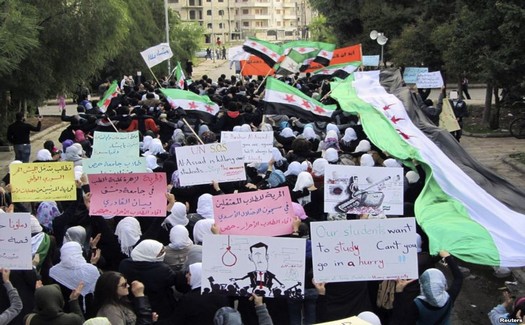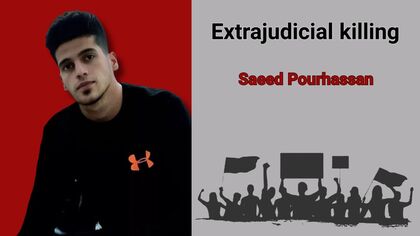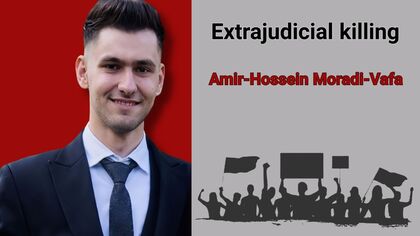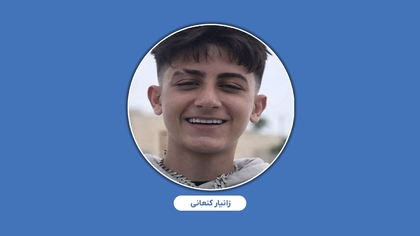Violence continues across Syria
14:36 - 10 December 2011

Kurdpa - Syrian forces have killed at least 30 people, including three children, after firing on anti-government demonstrations across the country during a planned national strike, activists have said.
Two boys, ages 10 and 12, were hit by stray bullets near government checkpoints on Friday in Homs, Syria\'s third-largest city and a hotbed of opposition to the regime, according to the London-based Syrian Observatory for Human Rights. Another activist group, the Syrian Revolution General Commission, said three defected soldiers had also been killed there.
Activists dubbed Friday the day of the \"Dignity Strike\" and had hoped to stage a mass display of civil disobedience. There were also reports of violence and arrests in Aleppo and Damascus, the capital.
Rami Abdul-Rahman, the head of the observatory, said the 10-year-old was shot as he crossed the street in the Bab Sbaa neighbourhood and the 12-year-old was struck as he walked in a crowd exiting a mosque.
Warning of \'massacre\'
Seven people in total have died in Homs on Friday, according to the anti-government Local Co-ordination Committees, while government shelling struck three houses and gunfire left \"many\" injured in the Khaldiyeh neighbourhood, where well-known actress Fadwa Soliman led midday prayers.
The opposition Syrian National Council has warned of an impending \"massacre\" in Homs as it claimed thousands of troops and militiamen were encircling the city.
Security forces also reportedly fired on protests in the Damascus suburbs and the eastern city of Deir el-Zour. In the southern town of Daraa, activists said telephone and Internet lines were cut.
The reports could not be confirmed because Syria has banned most foreign journalists and prevented independent reporting. Accounts from activists and witnesses, along with amateur videos posted online, provide key channels of
information.
\'Activists struggle for momentum\'
The violence comes as the government tries to choke off a nine-month uprising demanding the ouster of President Bashar al-Assad, whose family has ruled Syria for more than 40 years.
Despite sanctions from the United States and European Union, increasing isolation from its Arab neighbours and a demand from the United Nations to allow observers in, Assad has refused to buckle to the pressure. The UN estimates more than 4,000 people have been killed in the government crackdown since protest began in March.
Activists had hoped to use the \"Dignity Strike\" as a means to regain momentum for a peaceful protest movement after sectarian kidnappings and killings escalated in Homs this week, said Al Jazeera\'s Rula Amin, reporting from Beirut.
\"Some opposition leaders ... don\'t want to lose the mass protests, they don\'t want to lose the nature of this uprising as mass movement,\" Amin said. \"They want students to stop going to school ... they want government workers to stop working eventually, they want to cut the highways.\"
But the opposition remains somewhat split between the Syrian National Council (SNC), an Istanbul-based body, and the National Co-ordination Committee for Democratic Change, which is based inside Syria and advocates dialogue with Assad.
\"The problem at this point is that the Arab League is insistent on unifying everyone in the opposition,\" Louay Safi, an SNC member, told Al Jazeera, adding that his group represented the bulk. \"The problem is some factions ... don\'t represent the revolutionary forces. They are traditional political actors.\"
Source: Al Jazeera and agencies
Two boys, ages 10 and 12, were hit by stray bullets near government checkpoints on Friday in Homs, Syria\'s third-largest city and a hotbed of opposition to the regime, according to the London-based Syrian Observatory for Human Rights. Another activist group, the Syrian Revolution General Commission, said three defected soldiers had also been killed there.
Activists dubbed Friday the day of the \"Dignity Strike\" and had hoped to stage a mass display of civil disobedience. There were also reports of violence and arrests in Aleppo and Damascus, the capital.
Rami Abdul-Rahman, the head of the observatory, said the 10-year-old was shot as he crossed the street in the Bab Sbaa neighbourhood and the 12-year-old was struck as he walked in a crowd exiting a mosque.
Warning of \'massacre\'
Seven people in total have died in Homs on Friday, according to the anti-government Local Co-ordination Committees, while government shelling struck three houses and gunfire left \"many\" injured in the Khaldiyeh neighbourhood, where well-known actress Fadwa Soliman led midday prayers.
The opposition Syrian National Council has warned of an impending \"massacre\" in Homs as it claimed thousands of troops and militiamen were encircling the city.
Security forces also reportedly fired on protests in the Damascus suburbs and the eastern city of Deir el-Zour. In the southern town of Daraa, activists said telephone and Internet lines were cut.
The reports could not be confirmed because Syria has banned most foreign journalists and prevented independent reporting. Accounts from activists and witnesses, along with amateur videos posted online, provide key channels of
information.
\'Activists struggle for momentum\'
The violence comes as the government tries to choke off a nine-month uprising demanding the ouster of President Bashar al-Assad, whose family has ruled Syria for more than 40 years.
Despite sanctions from the United States and European Union, increasing isolation from its Arab neighbours and a demand from the United Nations to allow observers in, Assad has refused to buckle to the pressure. The UN estimates more than 4,000 people have been killed in the government crackdown since protest began in March.
Activists had hoped to use the \"Dignity Strike\" as a means to regain momentum for a peaceful protest movement after sectarian kidnappings and killings escalated in Homs this week, said Al Jazeera\'s Rula Amin, reporting from Beirut.
\"Some opposition leaders ... don\'t want to lose the mass protests, they don\'t want to lose the nature of this uprising as mass movement,\" Amin said. \"They want students to stop going to school ... they want government workers to stop working eventually, they want to cut the highways.\"
But the opposition remains somewhat split between the Syrian National Council (SNC), an Istanbul-based body, and the National Co-ordination Committee for Democratic Change, which is based inside Syria and advocates dialogue with Assad.
\"The problem at this point is that the Arab League is insistent on unifying everyone in the opposition,\" Louay Safi, an SNC member, told Al Jazeera, adding that his group represented the bulk. \"The problem is some factions ... don\'t represent the revolutionary forces. They are traditional political actors.\"
Source: Al Jazeera and agencies



